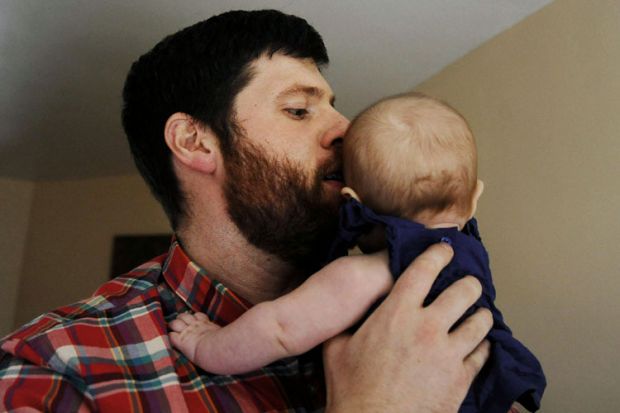Source: Alamy
Code of practice: allowances have been made for academics on paternity leave
Arrangements put in place for the research excellence framework that allowed universities to submit academics whose work was affected by special circumstances such as periods of maternity leave have “succeeded”, according to a report.
But such circumstances were reported at a far lower rate by staff submitted to the physical sciences panel than those involved with other panels, a phenomenon that requires more investigation, says the report by the REF Equality and Diversity Advisory Panel.
Future exercises should also consider making allowances about research productivity for staff on teaching-only contracts, it adds.
To try to improve the diversity of researchers submitted for the REF, funding bodies introduced measures such as requiring all institutions to have a code of practice for selecting staff. They also allowed individuals whose productivity was affected by specific circumstances, such as periods of maternity or paternity leave, to submit fewer than four research outputs for assessment.
The Equality and Diversity in the 2014 Research Excellence Framework report finds that overall 29 per cent of all staff submitted to the REF had individual circumstances that prevented them from submitting four outputs, up from 12 per cent in the 2008 research assessment exercise.
The arrangements allowed universities to be “more inclusive” in their submissions, and staff “trusted the process”, the report says.
Among such staff, the proportion of work judged to be world-leading or internationally excellent was about the same as it was among all staff submitted. This demonstrates that the arrangements “have succeeded in enabling institutions to submit staff who had produced excellent research but may not otherwise have been included”, the report adds.
However, the proportion of academics reporting individual circumstances varied by discipline. About 35 per cent of those submitted to Main Panel D, which covers arts and humanities, fell into this category, compared with just 22 per cent in Main Panel B, which covers the physical sciences.
The percentage of staff with “complex circumstances”, such as acute physical illness or caring responsibilities, was also lowest for the physical sciences, at just 0.9 per cent. This compares with 2.7 per cent in the arts and humanities and a 1.8 per cent average across all disciplines.
“We recommend that the apparent lower rate of circumstances in Main Panel B be further explored,” the report says.
Each case of complex circumstances was reviewed individually by the panel, which included a GP. The report recommends that future exercises involve a clinical psychologist in the review work.
Universities could also benefit from being provided with templates to clarify the amount and level of detail required when submitting staff with special circumstances.
Dame Athene Donald, professor of experimental physics at the University of Cambridge, said that Main Panel B had a much higher percentage of early career researchers and a lower percentage of those working part-time or taking periods of parental leave than the others.
“It would not be surprising to find far fewer women were entered in Panel B units of assessment, not because of any institutional discrimination in those entered, but simply because statistically there are far fewer women in the disciplines covered,” she added.
Register to continue
Why register?
- Registration is free and only takes a moment
- Once registered, you can read 3 articles a month
- Sign up for our newsletter
Subscribe
Or subscribe for unlimited access to:
- Unlimited access to news, views, insights & reviews
- Digital editions
- Digital access to THE’s university and college rankings analysis
Already registered or a current subscriber? Login





